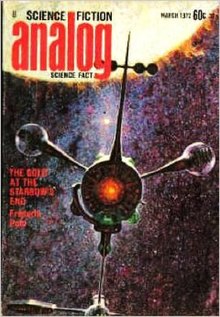The Gold at the Starbow's End
| "The Gold at the Starbow's End" | |
|---|---|
 |
|
| Author | Frederik Pohl |
| Country |
|
| Language | English |
| Genre(s) | Science fiction |
| Published in | Analog |
| Publication type | Periodical |
| Publisher | Condé Nast |
| Media type | Magazine |
| Publication date | March 1972 |
"The Gold at the Starbow's End" is a science fiction novella by American writer Frederik Pohl. Originally published in the March 1972 issue of Analog Science Fiction/Science Fact, it was nominated for both the 1973 Hugo Award for Best Novella and the 1973 Nebula Award for Best Novella. It did win the 1973 Locus Award for Best Novella.
Writing in The Encyclopedia of Science Fiction, John Clute and Brian Stableford noted that Pohl's longer work had greatly improved after he stopped being the editor of Galaxy Magazine and the Worlds of If in 1969. They considered "The Gold at the Starbow's End" to be an important transitional work leading to his better-known work of the late 1970s and 1980s. As the editor of Platinum Pohl (a collection of Pohl's work), James Frenkel described "The Gold at the Starbow's End" as a "wild adventure" that also addressed "the conflict between the needs of science and the exigencies of balancing a budget".
Pohl later expanded the novella into a full-length novel, which was published in 1982 under the name Starburst.
The story is told with two narrative devices—reports from members of the crew of the U.S. Starship Constitution alternating with a traditional third-person narration of the activities back on Earth. The main protagonist of the activities on Earth is Dr. Dieter von Knefhausen, the scientist in charge of the U.S. space program.
In the first report from the starship, the reader learns that the ship is approximately one month into a multi-year journey to the Alpha Centauri star system, where the crew will begin colonization of the planet Alpha-Aleph. Already, the crew is finding they have too much free time and have begun filling that time by studying various problems in mathematics. In the first narration of the action on Earth, the reader learns that society has become dystopian. The possibility of colonizing Alpha-Aleph is a source of hope for a better future.
...
Wikipedia
